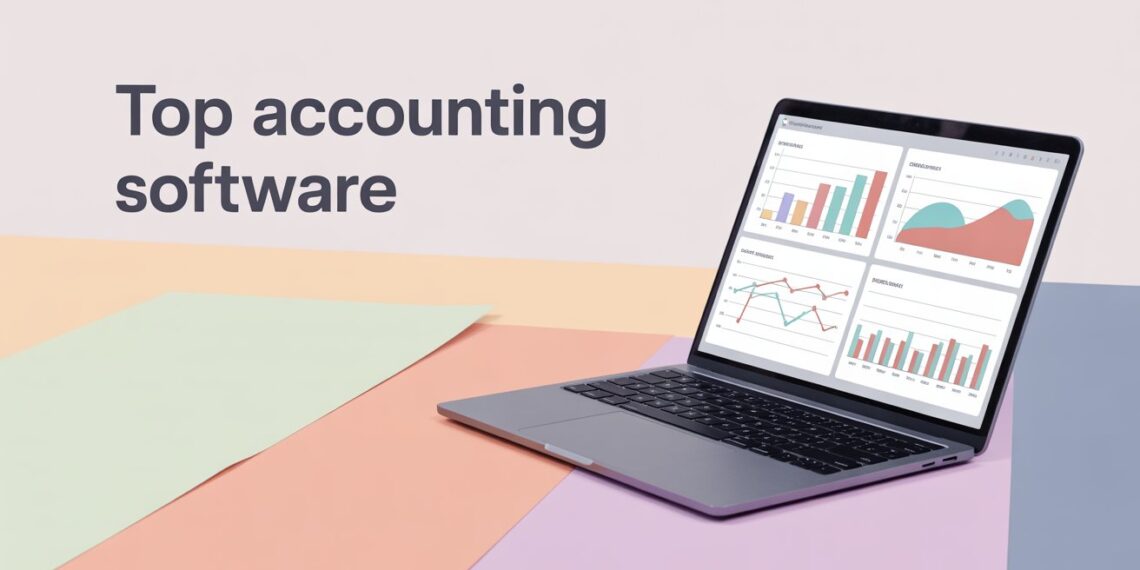Managing business finances in 2026 is radically different from just a few years ago. AI-driven automation, real-time tax compliance, and predictive financial modeling have become mainstream and small businesses are benefiting the most. Whether you’re a solopreneur or a scaling startup, choosing the right accounting software can directly influence profitability, cash-flow visibility, and even decision-making speed.
In this updated guide, you’ll find expert-backed analysis, 2026 trends, fresh comparisons, and new features released in 2024–2025 to help you choose accounting software that gives your business a real operational edge.
Why Small Businesses Need Accounting Software in 2026
Manual bookkeeping isn’t just inefficient, it’s now a competitive disadvantage.
Three major shifts changed accounting between 2023–2026:
1. AI Automation Became Standard
Since 2024, leading platforms like QuickBooks and Xero introduced AI that:
-
categorizes expenses automatically with >95% accuracy
-
predicts cash flow dips weeks in advance
-
drafts invoices and reconciles transactions
Many small business owners report saving 4–10 hours per week thanks to AI automations.
2. Real-Time Tax Compliance
With new digital tax regulations rolling out globally (including the expanding U.S. e-file mandates in 2025 and EU e-invoicing standards), software now:
-
checks tax compliance automatically
-
updates tax rates instantly
-
prepares filings proactively
3. Banking & Payment Integration Are Now Instant
Most platforms now support:
-
same-day bank syncing
-
integrated payment links in invoices
-
real-time revenue dashboards
This isn’t just convenient, it improves cash flow consistency dramatically.
Key Features to Look for in 2026 Accounting Software
These criteria matter more than ever:
✔ Ease of Use
Look for software that requires no accounting background. Clean dashboards, guided workflows, and AI helpers are now standard — and should be expected.
✔ AI Insights
Not just reporting, but explanations:
-
“Your labor costs rose 12% due to XYZ.”
-
“Expect cash shortage in 5 days based on bill schedule.”
✔ Automation Depth
Evaluate how much work the system does without you:
-
Auto-categorization
-
Automated invoicing
-
Bill scanning
-
Reconciliation
✔ Scalability
If you might hire, expand to multiple locations, or sell online, you’ll want software that grows without forcing a migration.
✔ Integrations
In 2026, you should expect:
-
CRM integrations
-
E-commerce integrations (Shopify, Amazon, Etsy)
-
Payment tools (Stripe, Square, PayPal)
✔ Transparent Pricing
Avoid software with hidden per-user or per-invoice fees.
The Best Accounting Software for Small Businesses (2026 Edition)
Below are the most up-to-date rankings, based on performance, 2024–2025 feature updates, pricing shifts, and user experience.
1. QuickBooks Online – Best Overall in 2026
Best for: Most small to mid-sized businesses
QuickBooks continues to dominate not because it’s the default choice, but because it keeps innovating. In late 2024 and throughout 2025, QuickBooks released AI Reconcile™, Predictive Cash Flow 2.0, and automated tax prep enhancements.
Why It Stands Out in 2026
-
Industry-leading AI
-
Excellent cash-flow forecasting
-
Strong inventory & job costing
-
Tight e-commerce integrations
Pros
-
Fastest and most accurate AI categorization
-
Exceptional reporting depth
-
Large accountant network
Cons
-
Higher pricing since the 2025 increase
-
Occasional complexity for very small businesses
2. Xero – Best for Global and Remote Teams
Best for: Growing businesses, international teams, service companies
Xero’s strength is simplicity combined with global capabilities. It appeals to owners who want clean UI, unlimited users, and excellent collaboration.
What’s New (2024–2025)
-
Enhanced AI bill capture
-
Better project tracking analytics
-
Expanded e-commerce integrations
Pros
-
Unlimited users
-
Beautiful UI
-
Smooth bank reconciliation
Cons
-
Payroll still limited in many regions
-
Learning curve for deeper features
3. FreshBooks – Best for Service-Based Businesses
Best for: Freelancers, agencies, consultants, creatives
FreshBooks continues to excel in client billing and time tracking, and its 2025 updates introduced:
-
Smart Invoice Follow-Up automation
-
Integrated client approval workflows
-
Advanced project profitability reports
Pros
-
Best-in-class invoicing
-
Outstanding customer support
-
Easy time tracking
Cons
-
Not ideal for inventory or manufacturing
-
Limited scalability for larger teams
4. Zoho Books – Most Affordable & Best Free Plan
Best for: Micro-businesses, startups, cost-conscious teams
Zoho updated its 2025 feature set with:
-
New automation builder
-
Enhanced client portal
-
Better GST/VAT handling
Pros
-
True free plan (revenue-based eligibility)
-
Strong automation tools
-
Excellent mobile app
Cons
-
Fewer integrations than QuickBooks or Xero
-
Free version limited to small teams
5. Wave – Best Fully Free Alternative
Best for: Solopreneurs, part-time businesses
Wave remains unmatched as a genuinely free option with zero monthly cost.
Pros
-
Fully free core features
-
Clean interface
-
Great for simple accounting needs
Cons
-
Limited support
-
No advanced features or scalability
Updated 2026 Top 10 Accounting Software List
Rank |
Software |
Best For |
Why It Stands Out |
|---|---|---|---|
1 |
QuickBooks Online |
Most businesses |
Best AI & reporting |
2 |
Xero |
Global & growing teams |
Unlimited users |
3 |
FreshBooks |
Service professionals |
Elite invoicing + time tracking |
4 |
Zoho Books |
Budget-friendly startups |
Best free plan |
5 |
Wave |
Solo entrepreneurs |
100% free |
6 |
Sage Business Cloud |
International SMBs |
Strong compliance tools |
7 |
Kashoo |
Simple users |
No-frills, ultra-easy |
8 |
FreeAgent |
Contractors |
Real-time tax predictions |
9 |
ZipBooks |
Insights-focused teams |
Smart financial health scoring |
10 |
Oracle NetSuite |
Fast-scaling companies |
Full cloud ERP |
Comparison Highlights (New for 2026)
QuickBooks vs. Xero
Feature |
QuickBooks |
Xero |
|---|---|---|
AI Automation |
⭐⭐⭐⭐⭐ |
⭐⭐⭐⭐ |
Best For |
US-based businesses |
International teams |
Inventory |
Better |
Good |
Pricing |
Higher |
Moderate |
FreshBooks vs. Zoho Books
Feature |
FreshBooks |
Zoho Books |
|---|---|---|
Invoicing |
Best overall |
Very good |
Free Plan |
No |
Yes |
Time Tracking |
Excellent |
Moderate |
Scalability |
Low |
Moderate |
Wave vs. Zoho Free
Feature |
Wave |
Zoho Free |
|---|---|---|
Cost |
Fully free |
Conditional |
Features |
Basic |
More robust |
Support |
Limited |
Better |
Specialized Tools for Niche Needs (2026)
Best for E-commerce
-
QuickBooks Online (Shopify, Amazon, Square integration)
-
Xero (Shopify + WooCommerce bundle options)
Best for International Businesses
-
Xero
-
Sage Business Cloud
Best for Service-Based Teams
-
FreshBooks
-
FreeAgent
Best for Ultra-Simple Needs
-
Kashoo
-
Wave
2026 Buying Guide: How to Pick the Right Accounting Software
1. Map Your Needs
Do you bill clients or sell products? Need payroll? Inventory? Multi-currency?
2. Choose Your Level of Automation
High-automation systems like QuickBooks reduce workload significantly, while simpler tools like Wave require more manual work.
3. Test 2–3 Options
Most offer 14–30 day trials. Try:
-
generating an invoice
-
connecting your bank
-
adding expenses
-
testing reporting
4. Think 2–3 Years Ahead
Pick software that works:
-
as you hire
-
as you expand
-
as regulations change
FAQs (Updated 2026)
1. What is the best truly free accounting software in 2026?
Wave remains the best fully free product. Zoho Books offers a free tier, but eligibility is revenue-based.
2. What is the easiest accounting software for non-accountants?
FreshBooks and Wave score the highest for ease of use.
3. Which software is best for taxes in 2026?
QuickBooks leads due to real-time tax updates and automated filing support.
4. Can AI replace accountants?
No but it reduces manual work. In 2025 surveys, accountants report spending 35–45% less time on reconciliation thanks to AI automations.
5. Is Excel still viable?
Only for extremely simple record-keeping. It lacks automation, audit trails, and compliance features.
Conclusion: The Best Accounting Software for Small Businesses in 2026
If you want the most complete, future-proof system, QuickBooks Online remains the top choice in 2026 thanks to its unmatched AI features and scalability.
If you operate internationally or prefer a clean, collaborative UI, Xero may be a better fit.
For service-based freelancers and small teams, FreshBooks provides the most refined invoicing and time tracking experience.
For budget-conscious startups, Zoho Books and Wave deliver exceptional value including free plans.









